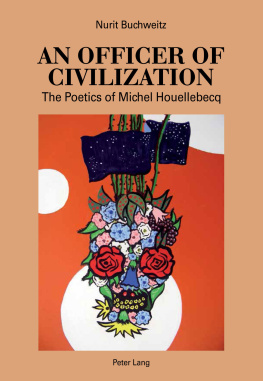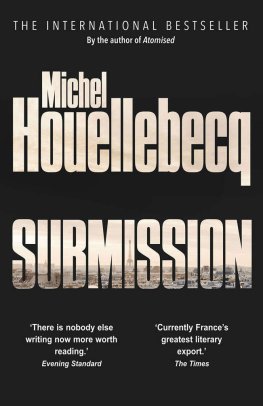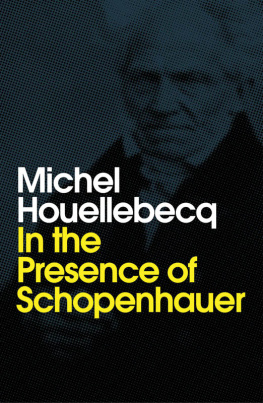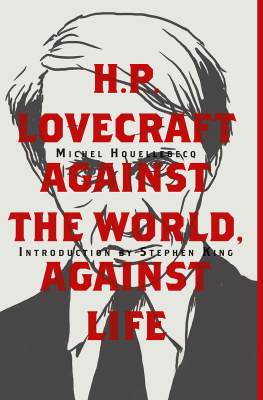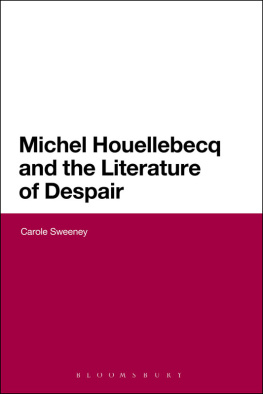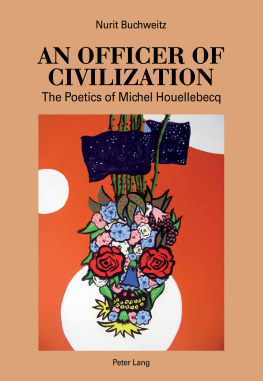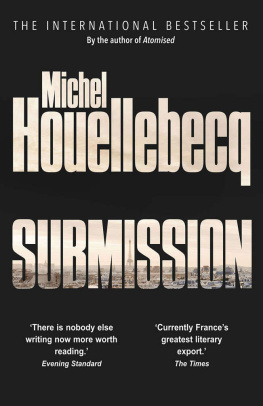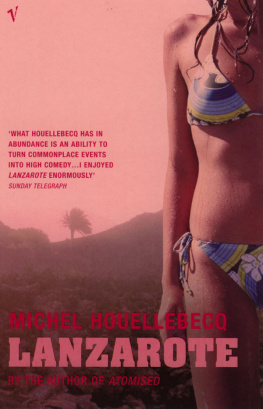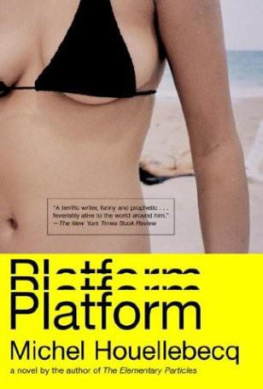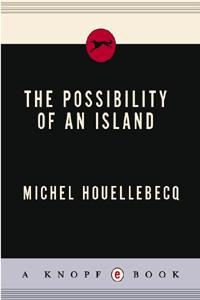Nurit Buchweitz
AN OFFICER OF CIVILIZATION
The Poetics of Michel Houellebecq

Bern Berlin Bruxelles Frankfurt am Main New York Oxford Wien
Bibliographic information published by die Deutsche Nationalbibliothek Die Deutsche Nationalbibliothek lists this publication in the Deutsche Nationalbibliografie; detailed bibliographic data is available on the Internet at http://dnb.d-nb.de.
British Library Cataloguing-in-Publication Data: A catalogue record for this bookis available from The British Library, Great Britain
Library of Congress Control Number: 2015931744
Cover Image: Roee Rosen, The Second Funeral of Roee Rosen, Seen From His Own Viewpoint After Being Buried, With the Ground Transparent, 2008 (Detail), Oil on Canvas, Two circles, 150 cm diameter each, Courtesy of the artist and Rosenfeld Gallery.
ISBN 978-3-0343-1581-4 br. ISBN 978-3-0351-0766-1 eBook
This publication has been peer reviewed.
Peter Lang AG, International Academic Publishers, Bern 2015
Hochfeldstrasse 32, CH-3012 Bern, Switzerland
info@peterlang.com, www.peterlang.com
All rights reserved.
All parts of this publication are protected by copyright.
Any utilisation outside the strict limits of the copyright law, without the permission of the publisher, is forbidden and liable to prosecution.
This applies in particular to reproductions, translations, microfilming, and storage and processing in electronic retrieval systems.
About the author
Nurit Buchweitz is a Senior Lecturer of Comparative Literature at Beit Berl College in Israel. She has previously published the books Permit to Pass: Generation Shift, Meir Wiezeltier and the Poetry of the 1960s (2008, Hebrew); In Other[s] Words: Studies in Hebrew and Arabic Literature (2010, Hebrew); Sensational Visual Pleasures in Cinema, Literature and Visual Culture: the Phallic Eye (2014).
About the book
Michel Houellebecq posits himself as an officer of civilization, offering a map of contemporary reality and according literature a substantial role in the field of public involvement. His unique style problematizes contemporary cultural processes and deconstructs the aesthetic and ideological thought-habits that design the collective imaginary of our era. As such, this book seeks to analyze the particularities of Houellebecqs poetics in the context of literary tradition, intertextual relations, psycho-cultural aspects and social semiotics, alongside contacts with the contemporary field of art. The author focuses on Houellebecqs poetical differentia specifica, the unique and innovative intersection between the cooperation with transnational capitalism and the resentment toward ignorant indulgence in it. This book reads Houellebecq as both iconoclastic and subversive and at the same time as a commodity in the literary marketplace and shows how his narratives are harnessed for the purposes of activism in the service of engaged impact.
This eBook can be cited
This edition of the eBook can be cited. To enable this we have marked the start and end of a page. In cases where a word straddles a page break, the marker is placed inside the word at exactly the same position as in the physical book. This means that occasionally a word might be bifurcated by this marker.
To my parents Rosemarie and Abraham Koren
Contents
Must
I
Really
Be
An officer
Of the imagination
[]
Will I finally sit down in my pajamas in front of the fridge
Drinking sweet coffee and chewing on an avocado sandwich
After a working day that put order into a world
Of disorder, that stopped the currents before they washed-off
The city, the man and the houses, I wonder
Who would have done it but me
Imagining to myself how bad
The state of affairs would be without me
And what a comprehensive and multi-responsible operation
Is involved in the maintenance of civilization
Meir Wiezeltier, I Ask Myself, in idem, The Concise Sixties (Tel Aviv: Hakibbutz Hameuchad, 1984) [Hebrew]. My translation. ix | x
x | xi
The impetus, and ambition, to write this book arose from my fascination with Michel Houellebecqs powerful, intense, and unfeigned writing. I was particularly attracted to Houellebecqs fierce discourse and his overt engagement with reality.
I embarked upon this journey out of curiosity and it was indeed a thought-provoking experience. I soon began to discern that, in my opinion, Houellebecq shares many of the traits that drew me to the works of the Israeli poet laureate Meir Wiezeltier, which were the focus of my PhD dissertation and first book. In particular, both writers exercise a robust and compelling poetics. I do not attempt to compare between Houellebecq and Wiezeltier, nor do I suggest the existence of any intertextual relations between the two; suffice it to say that from my humble perspective, similarities appear evident. However, the title of this book is a citation from Wiezeltier, a phrase which I believe perfectly describes Houellebecqs position on reality.
In writing this manuscript I have benefited from the insights and assistance of family, friends, and colleagues.
I wish to extend my thanks to Prof. Ziva Shamir, who guided me when I first plunged into Wiezeltiers world, in hindsight facilitating me with the necessary tools to find my own way in Houellebecqs writings.
I am also grateful to my colleagues at Beit Berl College Israel, Prof. Amos Hoffman, Prof. Izhak Greenberg, and Prof. Tamar Ariav, for their encouragement, generosity and patience.
I owe a debt of gratitude to those who at have read all or parts of the manuscript and offered their valuable advice. Conversations with Dr. Cynthia Biron-Cohen, Dr. Gilad Padva, Dr. Einal Baram-Eshel, and Dr. Hana Livant helped me to sharpen my ideas and approach.
I would like to thank the many students who have participated in my seminars on Houellebecq, especially Adi Zidon, Rachel Arbel, and Lilach Borovsky, who helped me read Houellebecq and inspired me to keep an open mind. xi | xii
I am sincerely indebted to Dr. Rebecca Wolpe for her indispensible work in refining the shape of my book in matters of language and style. So many thanks to the devoted French editor Marlne Shemouni.
I am very grateful to the artist Prof. Roee Rosen for granting me permission to reproduce his image on the cover of my book. I chose the image out of deep appreciation of his art, and due to my contention that Roee Rosen shares Michel Houellebecqs conceptual environment and artistic style.
Finally, I would like to thank my husband Igal for his fervent moral support and my children, Erez and Yael, for their genuine inspiration. xii | xiii
| Extension | Extension du Domaine de la lutte | Whatever | Whatever |
| Particules | Les Particules Elmentaires | Particles | The Elementary Particles |
| Plateforme | Plateforme | Platform | Platform |
| Lanzarote | Lanzarote | Lanzarote | Lanzarote |
| Possibilit | La Possibilit dune Ile | Possibility | The Possibility of an Island |
| Carte | La Carte et le Territoire | Map | The Map and the Territory |
xiii | xiv
xiv | 1
Let us begin with a warm up: Michel Houellebecqs most recent novel, The Map and the Territory (La carte et le territoire, published in 2010), tells the story of the protagonists (Jed Martin) broken boiler. Most of the story unfolds in the prologue, with the incident of Jeds broken heating system serving as a frame for the other events that are woven into it the Christmas dinner that Jed is planning with his father and his completion of two paintings:
Next page
